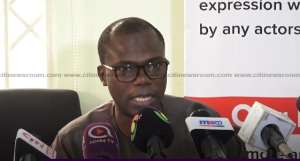
The Media Foundation for West Africa (MFWA) is questioning the validity of the findings in the European Union's Election Observation Mission (EOM) final report on Ghana's 2020 election which sort to suggest that a number of media houses in the country failed to be balanced in their coverage ahead of the polls.
Executive Director for the Foundation, Sulemana Braimah. on Eyewitness News, said the media cannot be blamed and accused of bias when political parties in opposition are more often than not unable to outdo incumbent governments during campaigning in electioneering periods.
He argued that the phenomenon is typical of every election season and cannot be interpreted to mean that media houses deliberately favour parties in power.
“The analysis suggested that there was some imbalance in how media covered the political parties especially favouring the ruling government. It’s been the phenomena since the 1992 elections and every election. That’s the pattern. It is a very complex thing because every party in government will organize a number of programs, sod-cuttings, commissioning of projects in election years. In such events, there are election messages so if you look at it, you will be tempted to code it as coverage in favour of the ruling party.”
“The other complex thing is that media organizations cannot make news for the political parties. They may want to be fair to all the political parties in the election year but if the opposition parties are unable to match up the number of activities that the ruling party organizes, this is the natural thing we will see, and it will stay forever”, he further explained.
The EU observer mission stated in its report for instance that, the state broadcaster, GTV, favoured the governing New Patriotic Party (NPP) in its election reportage.
It said 26.2 percent of airtime on election-related news programmes focused on activities of the NPP while 15.8 percent was allocated to the opposition National Democratic Congress (NDC).
On coverage given to the presidential candidates of the two parties, the report noted that the NPP's Nana Akufo-Addo, who was the incumbent President, was given a lot more attention, compared to his main challenger, John Mahama, while indicating that the coverage was generally neutral.
But according to Mr. Braimah, the real situation on the ground actually makes it difficult to have any research report coming up with a fair outcome.
“So we have to look at the nuances in the analysis. I think that this is a bad conclusion. Analysts often count the number of times a political party has been featured in the media and say one has been favoured. We need to go beyond that and look at whether the events are covered the same way with the same prominence and tone.
“For instance, if the NPP organizes a press conference, and it is covered and the NDC decided to react and the media says no, that will not be covered then that certainly will be an act that constitutes bias. But If the media houses open up their doors and cover the NPP and the NDC is unable to match up with the number of newsworthy events that the ruling government organizes, the media houses cannot organize events for the opposition party to equate”, he added.
However, after monitoring 13 media outlets with nationwide reach; GTV, Uniiq FM, Daily Graphic, Ghanaian Times, Adom TV, UTV, TV3, Joy FM, Peace FM, Citi FM, The Chronicle and Daily Guide, the observer mission noted that opportunity was offered for minor political parties to participate in programmes, although the NDC and NPP dominated coverage.
---citinewsroom




 Lay KPMG audit report on SML-GRA contract before Parliament – Isaac Adongo tells...
Lay KPMG audit report on SML-GRA contract before Parliament – Isaac Adongo tells...
 Supervisor remanded for stabbing businessman with broken bottle and screwdriver
Supervisor remanded for stabbing businessman with broken bottle and screwdriver
 NDC watching EC and NPP closely on Returning Officer recruitment — Omane Boamah
NDC watching EC and NPP closely on Returning Officer recruitment — Omane Boamah
 Your decision to contest for president again is pathetic – Annoh-Dompreh blasts ...
Your decision to contest for president again is pathetic – Annoh-Dompreh blasts ...
 Election 2024: Security agencies ready to keep peace and secure the country — IG...
Election 2024: Security agencies ready to keep peace and secure the country — IG...
 People no longer place value in public basic schools; new uniforms, painting wil...
People no longer place value in public basic schools; new uniforms, painting wil...
 'Comedian' Paul Adom Otchere needs help – Sulemana Braimah
'Comedian' Paul Adom Otchere needs help – Sulemana Braimah
 Ejisu by-election: Only 33% of voters can be swayed by inducement — Global InfoA...
Ejisu by-election: Only 33% of voters can be swayed by inducement — Global InfoA...
 Minority will expose the beneficial owners of SML, recover funds paid to company...
Minority will expose the beneficial owners of SML, recover funds paid to company...
 Prof. Opoku-Agyemang has ‘decapitated’ the NPP’s strategies; don’t take them ser...
Prof. Opoku-Agyemang has ‘decapitated’ the NPP’s strategies; don’t take them ser...
